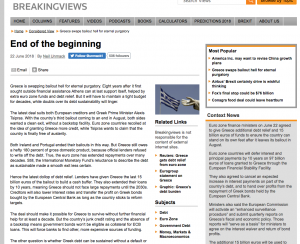Greek PM Alexis Tsipras mighty have declared the end of the memoranda for his country in fanfare at the Zappeion Hall on Friday night, where he wore a necktie for the first time to celebrate the dealt the Eurogroup, but many pundits and media analysts do not share his optimism. In a piece entitled “End of the beginning”, Reuters writer Neil Ummack claims Greece has swapped “bailout hell for eternal purgatory”. The author claims both sides (Greece and the Eurozone countries) wanted a deal as Tsipras wanted to claim the country had finally exited austerity scoring a huge political win, while Greece’s creditors were unwilling to give the embattled country even more credit. He points out that the country is hardly free as its lenders will be monitoring its performance for decades, while it is not sure whether the debt is sustainable.
From Reuters:
by Neil Ummack
Greece is swapping bailout hell for eternal purgatory. Eight years after it first sought outside financial assistance Athens can at last support itself, helped by extra euro zone funds and debt relief. But it will have to maintain a tight budget for decades, while doubts over its debt sustainability will linger.
The latest deal suits both European creditors and Greek Prime Minister Alexis Tsipras. With the country’s third bailout coming to an end in August, both sides wanted a clean exit, without a backstop facility. Euro zone countries recoiled at the idea of granting Greece more credit, while Tsipras wants to claim that the country is finally free of austerity.
Both Ireland and Portugal ended their bailouts in this way. But Greece still owes a hefty 180 percent of gross domestic product, because official lenders refused to write off the debt. True, the euro zone has extended repayments over many decades. Still, the International Monetary Fund’s reluctance to describe the debt as sustainable made a smooth exit less certain.
Hence the latest dollop of debt relief. Lenders have given Greece the last 15 billion euros of the bailout to build a cash buffer. They also extended their loans by 10 years, meaning Greece should not face large repayments until the 2030s. Creditors will also lower interest rates and transfer the profit on Greek bonds bought by the European Central Bank as long as the country sticks to reform targets.
The deal should make it possible for Greece to survive without further financial help for at least a decade. But the country’s junk credit rating and the absence of a backstop means government bonds won’t be eligible as collateral for ECB loans. This will force banks to find other, more expensive sources of funding.
The other question is whether Greek debt can be sustained without a default or further writedowns. If the government delivers on its promise to maintain a budget surplus before interest payments of over 3.5 percent of GDP – three times the euro zone average – until 2022, and 2.2 percent thereafter, the debt load will slowly fall.
Yet Greece’s unemployment rate of 20 percent is more than twice as high as in the rest of the single currency area. And euro zone officials will still visit every quarter. The country has escaped its bailout hell, but is hardly free.
Ask me anything
Explore related questions






